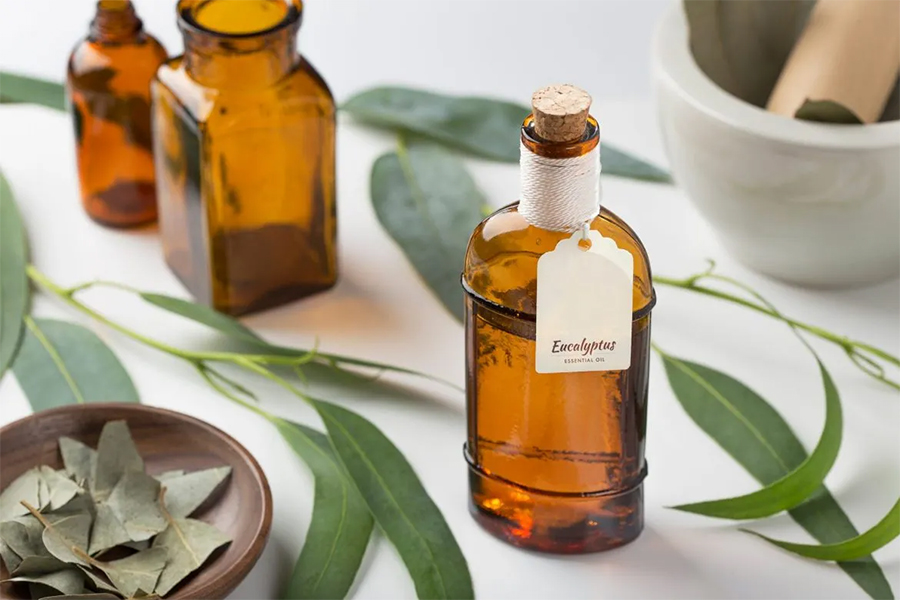From relieving symptoms of cold and congestion to improving dental health, eucalyptus essential oil benefits your health in many ways. Personally, I like to use it to help elevate my mood, but, thanks to its antibacterial, anti-fungal, and anti-inflammatory properties, there are many eucalyptus essential oil uses for everyone.
Let’s take a look at what makes this oil so powerful and useful, the best eucalyptus aromatherapy benefits, and even ways you can use it topically to support your health and wellness goals.
What Is Eucalyptus?
If you’ve ever seen a picture of a koala bear chewing on a branch of leaves, you’ve seen eucalyptus. Known as Eucalyptus globulus, the eucalyptus tree, or gum tree as it’s also called, is native to Australia. Eucalyptus oil was used in traditional Aboriginal medicine to treat wounds and infections.
However, the healing properties of eucalyptus became widely known, and it has also been used in other traditional medicine systems around the world. Today, many people use eucalyptus essential oil as a home remedy, particularly to help relieve cough and cold symptoms, among other uses.
Continue reading to learn more about several proven eucalyptus essential oil benefits plus a few easy eucalyptus essential oil uses you can enjoy at home.
5 Eucalyptus Essential Oil Benefits
So, what is eucalyptus oil used for? People have used eucalyptus oil to help treat a variety of ailments for centuries. And researchers have found scientific evidence for many of these eucalyptus health benefits, including pain relief, anti-inflammatory, and antibacterial and antifungal properties. Below I’ve listed five eucalyptus essential health benefits.
Cough and Cold Relief
Eucalyptus oil has long been used as a folk remedy for cough and cold symptoms. Scientific evidence now supports that eucalyptus essential oil benefits include antibacterial, antifungal, and analgesic properties. These properties help to relieve the common cold, sore throats, and symptoms of upper respiratory infections such as cough and congestion.
Skin Health
Research has shown that eucalyptus oil benefits for skin include antiseptic properties that help promote wound healing. Eucalyptus oil also has antimicrobial and anti-inflammatory properties. These properties not only help to heal wounds but also to soothe and eliminate other types of skin irritation, such as acne.
Pain Relief
Not only has eucalyptus oil been found helpful in wound healing and respiratory relief, but researchers have also documented its ability to help relieve pain and inflammation.
For example, a study on using eucalyptus oil aromatherapy to help patients recovering from total knee replacement (TKR) surgery concluded that inhaling eucalyptus oil decreased participants’ pain and blood pressure. The study suggests that eucalyptus could be used as a therapy to help patients recovering from TKR.
Anxiety and Relaxation
Eucalyptus aromatherapy benefits include helping to relieve anxiety by providing helping to uplift your mood. A study found that one of the active constituents of eucalyptus oil known as 1,8-cineole was found to help relieve anxiety. The researchers concluded that inhalation of eucalyptus oil blended with almond oil prior to and after surgery could help relieve anxiety in patients. [9]
Dental Health
Studies have shown that the antimicrobial activity of eucalyptus oil is effective at helping to treat dental diseases. Researchers studying the antimicrobial effects of essential oils on a dental pathogen examined several essential oils, including eucalyptus oil. The researchers determined that eucalyptus oil was the most effective oil among those studied.
How to Use Eucalyptus Essential Oil: Eucalyptus FAQs
Now that you know about some of the health benefits of eucalyptus oil, you may be wondering how to use it. Check out the FAQs below to help you enjoy some eucalyptus essential oil benefits.
How do I use eucalyptus essential oil?
Eucalyptus oil is a great choice for aromatherapy. Diffusing eucalyptus oil is a fragrant way to alleviate cold symptoms and clear your sinuses as well as soothe your nervous system and help to relieve stress.
Other eucalyptus essential oil uses include applying it topically and blending it into a bath. You can sprinkle a few drops into a bath or on the shower floor, allowing the steam to activate the essential oil.
Both of these methods are great not only for relaxation, but also for relieving sore muscles and helping to ease cold and respiratory infection symptoms. You can also get the same effect by hanging eucalyptus leaves in the shower.
If you are using eucalyptus oil for cold symptoms, you may also want to try blending it with a carrier oil and rubbing it under your nose. Do not rub eucalyptus oil on the nose of a child under 2 years old.
Do you have to dilute eucalyptus oil? What mixes well with eucalyptus oil?
If you are using eucalyptus oil topically, you must dilute it with a carrier oil. Carrier oils you may want to consider include jojoba and sweet almond oil. The carrier oil should constitute the majority of your blend. As an example, for one ounce of blended or coconut oil, use only a few drops of eucalyptus oil.
How do you use eucalyptus oil for arthritis?
Because eucalyptus oil has analgesic (pain-relieving) and anti-inflammatory effects, it can be used to help soothe rheumatoid arthritis. Blend the eucalyptus oil with a carrier oil and rub onto the affected area. You can also soak in a bath containing eucalyptus oil or try diffusing eucalyptus oil to help ease pain and inflammation.
Is Eucalyptus good for sleep?
Soaking in a tub with eucalyptus oil or enjoying some eucalyptus aromatherapy can help to alleviate anxiety and elevate mood, which may help to promote sleep.
Are eucalyptus leaves poisonous?
While adorable koala bears manage to subsist on eucalyptus leaves, they don’t have much company. Eucalyptus leaves are toxic to pretty much every other creature, including humans. Because of this, you need to be careful about how you use it.
Eucalyptus oil can be dangerous if taken inappropriately or given to children.
Eucalyptus oil should not be taken orally. Do not give cough drops that contain eucalyptus to children under age 6. Do not rub eucalyptus oil or salves onto the face or nose of children under age 2.
If you are pregnant or breastfeeding, do not use eucalyptus oil.
Eucalyptus oil side effects can be very unpleasant (including dizziness and diarrhea, among others), especially if you have certain health conditions. Be sure to speak with your healthcare provider before using eucalyptus oil if you have asthma, kidney disease, liver disease, or seizures or if you are taking medications that act on the liver.
Key Takeaways
Eucalyptus oil has been used as a folk medicine for centuries. Science now backs up eucalyptus essential oil benefits, including pain relief, antimicrobial properties, and anti-anxiety properties.
Eucalyptus oil should be used with a carrier oil.
Do not ingest eucalyptus oil.
Do not use eucalyptus oil if you are pregnant or breastfeeding.
If you have certain health conditions, including asthma, liver disease, kidney disease, or seizures, or if you are taking medications that affect the liver, speak with your healthcare provider first before using eucalyptus oil.
This story first appeared at Dr. Pingel







